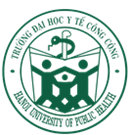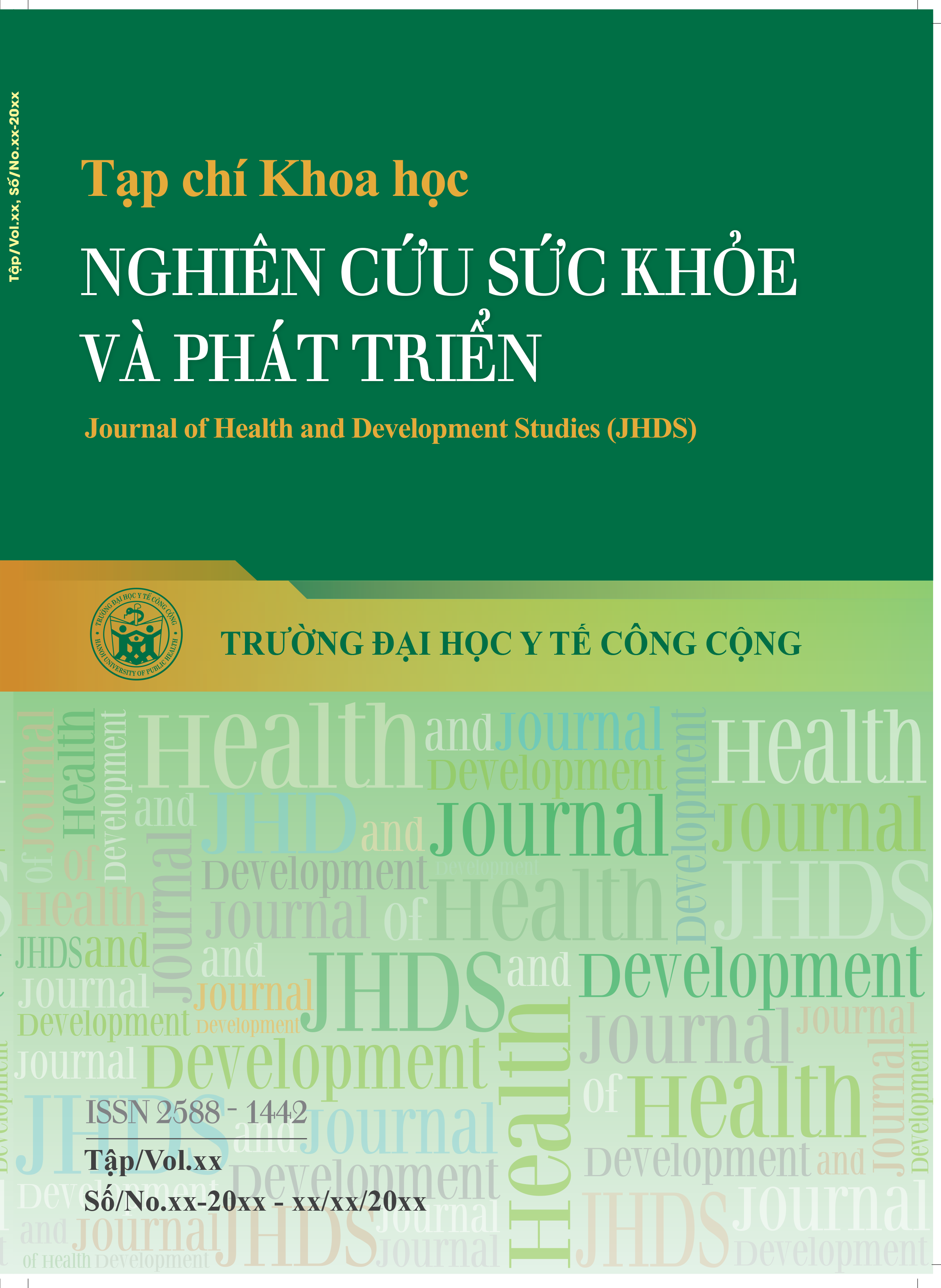Tạp chí
Khoa học Nghiên cứu Sức khỏe và Phát triển
(Journal of Health and Development Studies – JHDS)
Trường Đại học Y tế công cộng
ISSN (Print): 2588-1442
ISSN (Online): XXXX-XXXX
https://jhds.edu.vn
COVID-19 vaccination acceptance among health science students in Vietnam, 2021
- Mã bài báo : SKPT_22_006
- Ngày xuất bản : 30/08/2022
- Số trang : 19-28
- Tác giả : Nguyen Thi Thanh Nhiem
- Lượt xem : ( 1463 )
Danh sách tác giả (*)
- Nguyen Thi Thanh Nhiem 1 - Hanoi University of Public Health
- Dinh Thi Thu Trang 1 - Hanoi University of Public Health
- Dương Minh Duc 2 - Hanoi University of Public Health
- Nguyen Thi Thuy Lieu 3 - Hanoi University of Public Health
- Nguyen Thu Thuong 4 - Hanoi University of Public Health
- Tran Thi Tuyet Hanh - Hanoi University of Public Health
- Pham Quoc Thanh - Hanoi University of Public Health
- Brian Vu - University of Pennsylvania, Philadelphia, Pennsylvania
- Nguyen Thach Thao - Hanoi University of Public Health
- Ong Nguyen Huyen Trang - Hanoi University of Public Health
- Nguyen Van Bac - Thai Nguyen Medical University of Medicine and Pharmacy
- Ha Thanh Dat - Pham Ngoc Thach University of Medicine
- Truong Van Dat - Ho Chi Minh City University of Medicine and Pharmacy
- Phan Hoang Ngan - The University of Danang – School of Medicine and Pharmacy
- Truong Quang Trung - Hanoi Medical University
Objective: Health science students (HSS) are among the group of frontline healthcare providers who are likely to be exposed to SARS-CoV-2 by working with infected patients. With vaccines being one of the most crucial solutions to stop the pandemic, high COVID-19 vaccination coverage must be achieved in this group as soon as the vaccines are available. This research aimed to assess the COVID-19 vaccination acceptance rate and its associated factors among health science students in Vietnam.
Methods: This was a cross-sectional study, which surveyed online 8873 students in six health science universities in Vietnam, following the Health Belief Model (HBM) framework.
Results: In this study, 84.3% of students accepting the COVID-19 vaccines, 14.7% of students being undecided for vaccination, and 1% of students not accepting vaccination. Determinants of COVID-19 vaccination acceptance included their school year, self-reported health status, allergy histories, susceptibility in risk perception, and factors of the HBM model included perceived benefits and cues to action (p <0.01). In contrast, perceived barriers had a negative association with the probability of vaccine acceptance (p <0.01). These results should be used as scientific evidence to support the development of planning strategies to optimize vaccination uptake and success in vaccination campaigns for both health science students and the general population.
Conclusion: Health science students participating in the study had a high rate of COVID-19 vaccination acceptance. The theoretical framework recognized factors that influence vaccine acceptance. These are considered evidence for the development of planning strategies to optimize the vaccination uptake and offer success in vaccination campaigns for both health science students and the general population.
- DOI : https://doi.org/10.38148/JHDS.0604SKPT22-006
- Chủ đề : Mô hình sức khỏe, ốm đau, bệnh tật, chất lượng cuộc sống
- Loại bài báo : Nghiên cứu gốc
- Chuyên nghành : Chuyên Ngành Y
 Thông tin liên hệ : Dinh Thi Thu Trang
Thông tin liên hệ : Dinh Thi Thu Trang Email : dinhthutrang10@gmail.com
Email : dinhthutrang10@gmail.com Địa chỉ : Hanoi University of Public Health
Địa chỉ : Hanoi University of Public Health
Bài báo liên quan
- Co-design application and consideration for health technology intervention in Vietnam
- Cervical cancer screening by co-testing method for Vietnamese women 25 to 55 years old: A Cost – Effectiveness Analysis
- Inpatient satisfaction with healthcare services of a public tertiary general hospital in Vietnam during COVID-19 pandemic
- Cost-effectiveness of brentuximab vedotin in treating increased risk of relapse/progression of classical hodgkin lymphoma patients post autologous stem cell transplant
- A mobile application to support self-management among people with chronic kidney disease in Vietnam: Study protocol for a codesign-based intervention
- Working motivation of medical staff at Phong Tho District Health center, Lai Chau Province in 2021
- Dental care at commune health center in Cai Be district, Tien Giang province: Practical implications
- Community health care workers knowledge on hypertension and diabetes in a mountainous province in Vietnam
- COVID-19 vaccination acceptance among health science students in Vietnam, 2021
- The status of watching eating videos on social networks and relationship with eating behaviors of youngers
- Health Technology Assessment in Vietnam: Currant Situation and Future Direction
Bài viết mới nhất
- Một số trang web hữu ích đối với các nhà khoa học
- Dành cho chuyên gia
- Tạp chí Khoa học Nghiên cứu sức khỏe và Phát triển duyệt tối đa 1,0 điểm ngành Y trong Danh mục Tạp chí khoa học được tính điểm của Hội đồng giáo sư Nhà nước
- CHÚC MỪNG NGÀY BÁO CHÍ CÁCH MẠNG VIỆT NAM (21/6)
- GS.TS Hoàng Văn Minh - Hiệu trưởng Nhà trường 'lọt top' nhà khoa học có chỉ số trích dẫn hàng đầu thế giới

 File toàn văn
File toàn văn